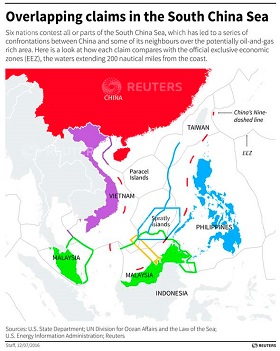Permanent Court’s of Arbitration in The Hague resolution that ruled in favor of the Philippines, which successfully challenged China’s claims to the South China Sea waters, will definitely complicate China’s stance in Southeast Asia. It will bring about additional pressure on China by the United States and Japan on the pretext of “compliance with international law.” At the same time court decision may pave the way for the resolution of territorial disputes in the South China Sea based on compromise. The Philippines has been waiting for The Hague court’s resolution to start bargaining on the most favorable terms.
Permanent Court’s of Arbitration in The Hague resolution that ruled in favor of the Philippines, which successfully challenged China’s claims to the South China Sea waters, will definitely complicate China’s stance in Southeast Asia. It will bring about additional pressure on China by the United States and Japan on the pretext of “compliance with international law.” Such outcome may lead to growth of both American and Chinese military activities in the region. This will consequently cause further escalation, including an increased likelihood of an armed conflict.
At the same time court decision may pave the way for the resolution of territorial disputes in the South China Sea based on compromise. President of the Philippines Rodrigo Duterte has repeatedly made it clear that he will be using the court ruling as a starting point for a new round of talks with Beijing. His readiness for dialogue with the PRC has caused certain concerns in Tokyo and Washington. The Philippines has been waiting for The Hague court’s resolution to start bargaining on the most favorable terms.
The negotiations that, basing on the tribunal’s decision, Duterte will conduct from the position of strength, have potential to bring the Philippines enormous benefits –China is now best to buy the escape from the disadvantageous political situation. Duterte’s willingness to exchange the South China Sea concessions for mere infrastructure investments was part of his election campaign. He had promised that if China was ready to build railways in the Philippines in six years’ time, he would back down on the maritime territorial dispute.
This position is natural and logical for a populist politician backed by the poor and unprivileged. Instead of a continuous, futureless, and costly (given the role of the Chinese economy in the region) struggle with the PRC for useless rocks and reefs with quite modest proven resources, now that the court has issued its decision, Duterte will manage to have China offer him very serious economic concessions. These will enable the country to create new production facilities, deal with the numerous bottlenecks of the Philippine infrastructure, and support the political future of the president.
China is signaling its readiness to bargain. However, since any compromise will mean further strengthening of Beijing’s strategic positions in Southeast Asia and growth of China’s influence on ASEAN members in exchange for nothing but money, neither the U.S. nor Japan is interested in the deal. Given the unstable nature of the Philippine internal policy and its susceptibility to external influence, it cannot be ruled out that the negotiation process will either be disrupted or take too long.
Overall, the Philippines and, even more so, other ASEAN members, including Vietnam, have no plans to drive China into a corner or make it give up on its claims and positions regarding the South China Sea — they are well aware that such plans would be impossible to implement. The policy of the ASEAN member-states is mostly based on maneuvering between the superpowers and bargaining. Irreversible confrontation with one superpower would imply their full dependence on the other one, which scares them as they tend to have almost as little trust in the United States as they have in China.
This trend applies even to the formal allies of the United States in the region — the statement by the Ministry of Foreign Affairs of Singapore issued following the decision of the court in The Hague shows no support for either side, whatsoever. The only exception is the poorest countries of the alliance, such as Cambodia and Laos, which have been under the major influence of China for some time now — this factor affects ASEAN’s capacity to pursue a consistent policy.
The interests of the United States and Japan are quite the opposite: they seek to make use of the court ruling to isolate China and weaken Beijing’s influence in the region and form a single relatively integrated bloc that would resist the Chinese “aggression and violations of international law” — almost the way it was done in Europe regarding Russia. The main issue that is being tackled now is, therefore, not the ownership of the reefs, rocks, and titles to the surrounding waters, but China’s place in the regional political landscape.
Hasty ill-considered steps can push China to isolation. Then again, if it shows weakness under the American pressure, consequences might be even more damaging. Not only will this scenario weaken the Chinese authority in the region, but also the Chinese government’s reputation will be ruined in the eyes of the local population. The ruling by the court in The Hague and the following US steps have already caused a growth of patriotic and nationalist sentiment in China. Chinese Internet censors have been challenged with an unfamiliar task — to delete calls to war from social networks.
On the one hand, China will need to demonstrate its willingness to embark on the dialogue with its neighbors in the region, whereas on the other hand, it will have to show its power, resolution, and determination to go all the way, if there is such need. It was this purpose that the organizers of the major military exercise in the South China Sea — which took several days and ended on Monday, the day before the Hague Tribunal announced its decision — had in mind. The exercise that included battle firing involved aviation, surface ships, submarines, and coastal missile units. China showed its combat capabilities in the region to the full extent. The tough statements by the Chinese government following the announcement of the ruling are also designed to show the resoluteness of the Chinese position. China may keep its promise and create an Air Defense Identification Zone (ADIZ) in the South China Sea, similar to the ADIZ in the East China Sea.
None of the stakeholders seem to be seeking a conflict; however, the situation is dangerous. The extra-active U.S. “freedom-of-navigation patrols” in the South China Sea, especially the attempts to fly over the Chinese islands or enter the 12-mile area around them can trigger an armed incident. It could become a real threat that everyone will have to respond to in a varying degree. There will be no sitting out in this situation.
Russia’s stance on the dispute in the South China Sea remains reasonable and rational. While refraining from supporting either side, Russia urges to resolve differences through peaceful negotiations while avoiding the internationalization of the conflict. The thoroughly observed neutrality does not apply to the United States’ actions pertaining to the conflict, though. Russia directly criticizes the interference of “extraregional countries,” while accusing them of the escalating tensions in the region. Foreign Ministry spokesperson Maria Zakharova made a statement that also falls in line with this policy. She stressed the necessity to express restraint and to resolve the conflict through negotiations and consultations between the parties involved while abiding international law. Still, the statement stresses that extraregional interference in the situation is counterproductive. Russia refrains from giving a legal evaluation to the Court ruling. It is very likely that such a stance will be relevant further on. In the case that extraregional powers become more involved, Russia may become much more critical of their role.






